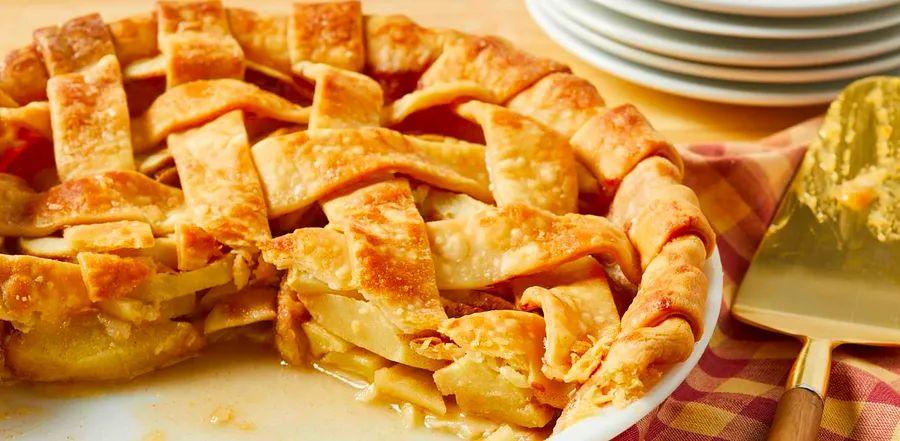I Asked Three Farmers to Choose the Best Apples for Baking, and This One Came Out on Top

With over 7,500 apple varieties grown globally, according to Washington State University, it can be overwhelming to decide which apples to buy, even when grocery stores and orchards narrow it down for you.
When it comes to snacking, the best apple is simply the one you enjoy most in flavor and texture. But when it comes to baking, the decision gets trickier. So, we turned to experts—the people who know apples best—to help us pick the ultimate baking varieties. Below, we share insights from two farmers who grow 43 types of apples, along with a produce inspector from a city known as “the apple capital of the world.”
Meet the Experts
- Randy Davidson, a Wenatchee, Washington-based produce field inspector for Whole Foods Market
- Angie Eckert, vice president of retail operations at Eckert’s Family Farms in Belleville, Illinois
- Rob Shenot, a sixth-generation apple farmer and the owner/operator of Shenot’s Farm & Market in Wexford, Pennsylvania
Key Characteristics of the Best Apples for Baking
“The distinction between ‘baking’ and ‘eating’ apples is pretty much arbitrary—any apple can be used for either purpose depending on personal preference,” explains Shenot, a sixth-generation apple farmer.
That said, our panel of experts agrees that two key factors really make apples stand out in baked goods, including:
- Tart flavor. According to Shenot, “the most important quality for baking apples is the level of tartness.” Apple desserts like pies, tarts, crisps, crumbles, and even apple butter and applesauce all call for some type of sweetener, so a naturally tart quality in baking apples is ideal. In tandem with the sugar (or honey, brown sugar, maple syrup, or other featured sweetener), “this combination creates a dynamic flavor profile that enhances the richness of baked goods.” explains Eckert.
- The “Goldilocks” texture. When cooked or baked, some apples turn to mush, and others stay too crunchy. “The best baking apples are firm with a crisp texture that stand up to heat without turning mushy,” says Davidson. The fruit should be firm when fresh, then soften just enough when baked, Eckert adds.
The Top Apples for Baking, According to Farmers

Peter Dazeley/Getty Images
Shenot acknowledges that selecting a single 'best' apple variety for baking is no easy task. Eckert agrees, emphasizing that every variety brings its own distinct characteristics to the table.
If Eckert had to choose just one apple variety for baking, regardless of the dish—be it pies, crisps, quick breads, or other seasonal treats—she would opt for Jonathan, a variety that Shenot also highly recommends.
According to Eckert, Jonathan apples strike the perfect balance of tartness to complement the sweetness in desserts. Their texture softens beautifully in the oven while retaining structure, making them ideal for baked goods where you want the apple to hold its shape yet remain tender.
Shenot suggests using a blend of apple varieties, especially for apple-based baked goods like pies and applesauce, to enhance the flavors and textures.
For a smoother texture and a bit more sweetness to balance the tartness of Jonathan apples, both Shenot and Eckert enjoy mixing in Golden Delicious. This variety is known for its versatility in baking, holding its shape well while softening in an ideal way.
Eckert ranks Golden Delicious as the second-best apple for baking. It softens beautifully during baking, offering a melt-in-your-mouth texture that is ideal for pies, cakes, and other desserts. The apple's natural sweetness also enhances the flavor of baked goods, reducing the need for extra sugar in your recipes.
If you can't find—or simply don’t prefer—those particular apples, consider creating your own custom baking blend. This allows you to tailor the tartness and texture to suit your specific tastes. There are many apple varieties that farmers recommend for baking, so feel free to experiment with different combinations based on your preferences and the type of dessert you're making.
Smoother and sweeter apples
- Idared
- McIntosh
- Pink Lady
Firmer and more tart apples
- Stayman
- Melrose
- Granny Smith
- Honeycrisp
Apples that are not recommended for baking
Some apples, due to their firm texture, are best suited for snacking or raw preparations like salads, fruit salsas, and slaws, according to farmers. These varieties are typically not ideal for baking and should be reserved for fresh uses.
- Gala
- Fuji
- Evercrisp
Shenot believes that Red Delicious could be considered the worst apple for baking. In his opinion, they have little to offer, except for being used to balance out the tartness in cider blends. 'I wouldn't recommend them for anything else,' he says.
Evaluation :
5/5



